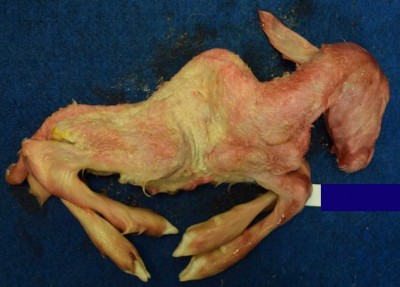Cache Valley Fever - Understanding the Prevalence in the Northeast
Amy Barkley, Livestock Specialist
Southwest New York Dairy, Livestock and Field Crops Program

Notice from Dr. tatiana Stanton:
Cache Valley Fever Virus (often referred to as CVV) is a mosquito-transmitted virus that can cause of infertility, abortions, stillbirths and congenital abnormalities in sheep and goats. Typical birth abnormalities may include one or more of the following: abnormally bent or shortened limbs or fused joints, shortened lower jaw, cryptorchidism (an undescended testicle), sideways or outward curvature of the spine, accumulation of fluid in the brain and/or hydranencephaly (portions of brain missing and filled with fluid instead). Offspring may be stillborn or live, premature or full term. It is most commonly diagnosed in sheep and goats who are due to give birth in the late fall and winter, usually prior to February in the Northeast, corresponding to exposure of the pregnant dams (during the first 2 months of gestation) to infected mosquitoes in the late summer/early fall.
Dr. Mary Smith DVM from the Cornell Veterinary Ambulatory Clinic wants to get an idea of how prevalent this virus currently is and whether its season is extending into birthing dates as late as February and March. She is asking that Northeast goat and sheep farmers who suspect they are experiencing Cache Valley Virus this year, fill out and return to her by email the attached questionnaire if at all possible so that we can better understand its prevalence. Finding out breeding dates and birth dates of affected litters is especially important to her. She is also interested in age of dams, what birth defects were observed, housing of dams in early/mid gestation etc. She welcomes photos if available.
[Please reach out to Amy Barkley to receive] Dr. Mary Smith's questionnaire as a fillable pdf file. If you would like to know more about Cache Valley Fever Virus, Dr. Mary Smith did a short presentation in November on Cache Valley Virus that covers testing/confirming the virus, risk factors and typical signs for the Cornell Experienced Commercial Goat & Sheep Farmer Discussion Group that meets by ZOOM on the Third Thursday of most months at 7:30 pm. The recording of Mary's presentation is available at https://youtu.be/N24PGeW7G_c . Please note that is youtu.be/N24PGeW7G_c . The _c does not show up well in the link.
Photo from the University of Guelph
Upcoming Events
WNY Pastureland Conversion & Soil Health Field Day
July 16, 2025
Middleport, NY
Join American Farmland Trust for the Western New York Soil Health Field Day on July 16, 2025, at Zeliff Farm in Middleport, NY, from 9:00 AM-3:15 PM. Learn about pasture conversion, soil health benchmarking, biochar in grazing systems, and best grazing practices. Plus, enjoy hands-on demos with the NY Soil Health Trailer, drones, and cover crops! Check out the attached agenda for more information about the field day and REGISTER HERE. Zeliff Farms is a regenerative beef operation who has recently partnered with AFT on outreach and education to farmers including learning circles and evaluating biochar effects on soil health.
IPM Strategies to Protect Corn and Soybean Seed in NY
July 30, 2025
Hamburg , NY
SWNYDLFC and Cornell IPM are hosting a grower meeting to discuss integrated pest management strategies for protecting corn and soybean seed in New York.
FAMACHA Training for Sheep and Goat producers in Woodhull NY
August 13, 2025 : FAMACHA Training in Woodhull
Woodhull, NY
Join us for a discussion and hands-on training for internal parasite integrated pest management in sheep and goats. Certification is available to all students participating in the workshop.
Announcements
No announcements at this time.





